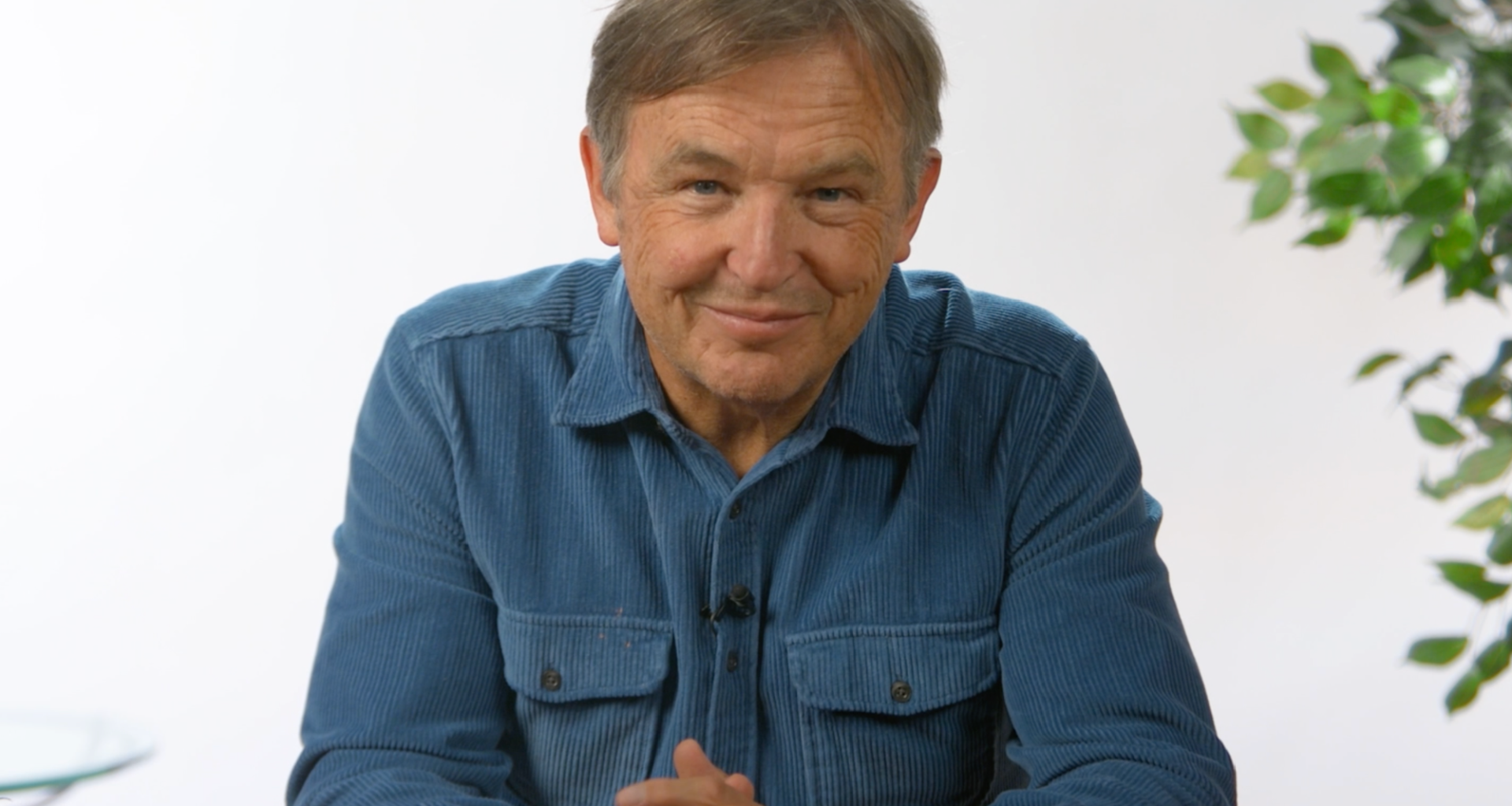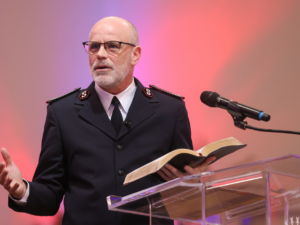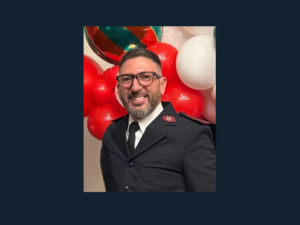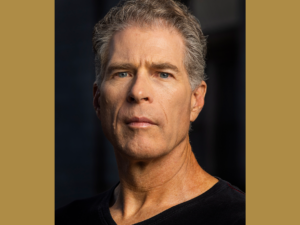Chances are, if you’ve been online at some point over the past decade, you’ve probably watched a TED Talk.
You know the format—world-renowned speakers, experts and innovators on various topics take center stage to present one great idea in 18 minutes or fewer.
TED Talks often challenge conventional thinking and offer new perspectives. They can be inspiring, thought-provoking, and even controversial—sometimes sparking spirited discussions and debates. They’ve gone viral countless times over the years.
There’s Brené Brown’s iconic talk on the power of vulnerability. Or perhaps you’ve watched Amy Cuddy’s talk on how our body language shapes who we are. There’s talks on how to have better conversations, the power of introverts and on the puzzle of motivation.
More than one billion TED Talks are viewed every year. And chances are, you know the name TED, in large part, because of a man named Chris Anderson.
As the curator of TED, Chris helped transform TED from a small, annual conference in Monterey, California, into the global phenomenon it is today. His TED mantra—”ideas worth spreading”—continues to flourish around the globe. It’s created a platform for people from all walks of life to gain access to new ideas and research on virtually any topic they find interesting, for free.
Chris was born in a remote village in Pakistan and spent much of his early years between India, Pakistan and Afghanistan, where his parents worked as medical missionaries. After graduating from Oxford University, Chris launched more than 100 successful magazines and websites before turning his attention to TED in 2001. Through various ventures, Chris has dedicated his career to sharing valuable ideas with the world.
In this episode, we’re talking with Chris about generosity and his recent book, “Infectious Generosity: The Ultimate Idea Worth Spreading.” In it, he explores the power of human kindness and its potential to transform the world. He explains why simple acts of generosity can have a profound impact on individuals and communities, and how the spread of kindness can create a more connected, compassionate society.
Show highlights include:
- The connection between generosity and gratitude.
- What “Infectious Generosity” means to Chris and why he believes it is the “ultimate idea worth spreading.”
- What motivates people to be generous.
- His interest in the topic.
- How a generous mindset can be cultivated.
- How religious models of giving could have an impact on a wider scale.
- Key factors for sustaining infectious generosity movements over time.
- How to take on this mindset in your life.
Listen and subscribe to the Do Gooders Podcast now. Below is a transcript of the episode, edited for readability. For more information on the people and ideas in the episode, see the links at the bottom of this post.
* * *
Chris Anderson: I’m Chris Anderson. I’m head of TED. I think that makes me a TED head. I’ve been running TED, the nonprofit for the last 20 years or so, and before that, I don’t know, media, entrepreneur, dreamer.
Christin Thieme: Dreamer. I like it. What have you seen recently that gives you hope?
Chris Anderson: I mean, you often to get hope, you need to switch off the news and just look at people.
Often the narratives that are shared, both in the mainstream news and in online media, people at their worst, we’re talking ourselves into these sort of tribal wars with each other and it’s very unpleasant where we believe that half the world is evil or mistaken and we find ourselves getting angrier and talking about them in the meanest possible ways. That is a zero sum battle that is horrible and does not give any hope at all. I find hope when you switch the narrative and you think about the world, first of all, just in terms of ordinary human relationships where people are capable of just being astonishingly kind and wonderful to each other and we’re capable of inspiring each other and getting a lot of joy from that, but also we’re capable of building things together. This makes me super excited when two people stop fighting each other and instead go to the world of imagination and possibility and what the future might be like if something different was built that opens up the door to so much possibility, and that’s really how we have built or that we’ve built.
It’s come from people imagining a world that might be a bit better and then what it takes to get it there. So I get a lot of hope from that. Just recently, I’ve spent a lot of time with people who are dreaming of different ways of solving the climate crisis, and they’re coming up with beautiful, powerful ideas of new ways of contributing to the world economy, new ways of making energy, new ways of growing the food. We need new ways of powering ships and airplanes and so forth. And when you see that process in action and see how much people are willing to do to make that real, that really gives me hope.
Christin Thieme: It’s such a different starting point too, to come at it in that I love that this is the time of year coming into the holidays where people seem to pay a little bit more attention to the goodness around them and are looking for it a little bit more. Hopefully it’s the time of year when we talk a lot about gratitude and as we’re in kind of that season right now, I’m wondering what you think about the concept of generosity and gratitude side by side. Do you think they’re linked?
Chris Anderson: Profoundly linked. They’re profoundly linked in a way it’s very hard to be generous without it being built on a foundation of gratitude. I think we’re wired to be generous, but it comes often as a natural response to perceived generosity in others. We are empathetic beings in a way and in general we respond to what other humans are doing. We’re social creatures. So when we see something to be grateful for, just that triggers a desire to respond. And good thing about gratitude is that you can, if you take a moment to stop sleep walking through the day and just think for a minute and look around, you can find so many things to be grateful for it. I mean, just being alive in the 21st century and not in the Middle Ages, for me at least, that’s a huge reason for gratitude. There’s just so many extraordinary things everywhere.
I look from the power socket in the wall that allows me to plug in any kind of amazing device that can make life happier through to just the fact that there is a war there at all, and that I’m protected from the cold outside right now through to the beauty of so many things that we buy and enrich our lives with and as well as the more obvious things of the people we love. And there’s just so much to be grateful for. And I think the first stop on someone’s generosity journey is a gratitude stop. It’s just to take a moment. It’s such an incredibly healthy way to start each day, just to take two minutes to breathe and think about something new to be grateful for, and it will automatically trigger a response in you to want to be kind.
Christin Thieme: I like that visual of it as a stop on the journey. That’s perfect. So what does “Infectious Generosity” then mean? And to borrow from your book title, why is it the “ultimate idea worth spreading?”
Chris Anderson: Well, let’s start with the latter thing first. I mean, generosity is, I think underpins everything that has made a livable life possible. We’re evolved. Apes and natural state is to live quite a difficult life, fighting for resources and just food to survive and so forth. And one of the most astonishing things about humans and some other social species is that we evolve these instincts, this desire to look out for each other, that other people’s needs actually really matter to us. When we see someone else suffering, it doesn’t take any effort to respond and go, no, that shouldn’t be. It just, it’s in us. We’re wired from that. We have been able to build systems that allow societies to flourish. And it’s always this weird mix of something biological of just a feeling. But layered on top of that is a sort of a learning which happens at a group level of how to amplify that and to make it more part of ourselves.
And without that, the world would be, it sometimes feels like a meme place. Without that, the world would be an impossible place. It would just be a Hobbesian world of destruction and fighting and clawing our way to some kind of survival. It’s all of what matters in life starts with the fact that we have this generosity instinct. And generosity is infectious naturally, biologically, in that if someone’s generous to you, you will respond. You’ll feel that you should respond. And the reason I wrote the book is that we’re in an era where we’re all connected more so than ever. And you would think that waves of kindness, waves of generosity would spread like never before. And in some cases they have. And the tragedy of the modern moment is that many other things are spreading as well. Like meanness is spreading and dislike and falsity and so many other things are spreading online.
So that in a way, some of the motivation of the book was to try to reclaim the internet and all the other tools of our connected age to spread the good stuff and not the bad stuff. And it’s not super easy to do simply because we’re sort of wired to pay more attention to what is bad. But that’s why we need to think about that and reverse that, because if we don’t reclaim that, the future is going to be very ugly. If it really feels right now, the future is the world is quite a mean place, especially in social media and so on. And I think that’s catastrophic for all of the things that we’re trying to fight for in the future.
Christin Thieme: So you mentioned some of the motivation about writing the book, but generosity as a concept is not new to you mean so much of TED is really founded in being generous in spreading these ideas, really. Is there a moment in your life when you realized this is it, generosity is the key here? Where did your interest in this topic and in this kind of frame for your work come from?
Chris Anderson: Well, I’ll give you two answers to that. I mean, first of all, my parents are missionaries and they’ve probably all my life, they have pushed us to live for something bigger than we are and have explained patiently that that actually is probably the only way to really lead a happy life if people who I mean ultimately aren’t that happy, they can get a moment of pleasure, but they can’t be deeply happy. It’s just how we’re wired. So there’s that. And then as a result of that, I’ve spent a lot of my life feeling guilty that I wasn’t really being generous enough and not really knowing how I could best step into that and taking over TED 20 years ago and gave me a chance to do that. And so there was indeed a big moment back then TED used to be a for-profit once a year conference.
I bought it—complicated story—using a foundation because I was broke and I had some money in a foundation. It was post the.com crash. And so TED was part of a nonprofit, and when online video came along, we kind of felt we had this obligation to share the content of TED. These talks were recorded quite nicely, so we thought we should share it, but wouldn’t that destroy the conference? Why would anyone come to the conference if the content was available for free? Well, we took the risk and started sharing the talks. And to my astonishment, far from destroying the conference, it boosted demand unimaginably like these talks ended up spreading all over the world and everyone wanted to come toted. And so the business entrepreneur part of me was going, wait a second. In this connected age, the rules of engagement may have changed actually what you should hold onto and what you trigger away, the rules have changed around that.
Giving stuff away can be amazing. And so that’s almost the strategy. Well, that is the strategy we adopted at TED that led us to launch this TEDx program where we gave away our brand so that anyone in the world could do their own TED conference with the letter X in there, TEDx Bangkok or whatever it was. And what it meant was that with just a tiny team in New York where I’m based, we ended up with 3000 curation teams around the world putting on TED events. They generated like 25,000 videos a year. I mean, you could never control or run a business at that scale with 10 people in New York. And yet that’s what the TEDx unit of TED does. So again, it’s like you give away something away. In this case, our brand, it becomes infectious. Lots of people want to do it, and what they give you back blows your mind. It blows your mind. There are probably 70,000 volunteers out there going through extreme stress and effort. So to put on these amazing local events and they do it, I don’t know, they do it kind of as a response. They got something good, they want to put on something good. And so it’s when you discover those sorts of ripple effects, it’s very, very exciting
Christin Thieme: Back to the idea of what can we build together. Love it.
Chris Anderson: Yes.
Christin Thieme: This might be an impossible question, but do you have a favorite TED Talk?
Chris Anderson: I have many, actually. I won’t tell you my favorite talk—it’s probably quite nerdy and whatever. One person who I’m very grateful to is one of the first talks that went viral because it impacted so many people. So Ken Robinson, he’s no longer with us, but he gave a talk about creativity in schools.
And he gave it to 800 people back in 2006. And even today, it’s still watched by several thousand people every day. And some of the ripple effects from that are just amazing. People have given up jobs and started schools. And I heard from an Indian woman a couple of years ago who loved this talk and she dropped her plans to be an accountant. She was in a school at the time and decided she would try and do a TED Talks sort of version for India. And so now today there’s 50 million people a month watching talks. She’s targeting their talks at the rural India, people who don’t have access to school and so forth. And if so, can only knew what the ripple effects were from his own generosity. He wasn’t paid. He came to dad, he gave this beautiful, hilarious talk. And so I guess I love seeing that ripple effect.
Christin Thieme: Yeah, absolutely. If generosity is intrinsic, can we cultivate a generous mindset or maybe improve upon it? And if so, what do you think some of the practical strategies around that are?
Chris Anderson: I think it’s like everything that’s hard in life, it gets easier with practice. My view of my simple view of human psychology is we have an instinctive mind and a reflective mind. And that our job is to use our reflective mind to get the most out of our instinctive minds. So we do this with diet or exercise or whatever. We carefully have these life hack strategies to try and be our better selves with generosity. The more you do it, the easier it gets to the muscle. And so I think it starts with the way, it definitely starts with generosity. And actually for some people it may start even before that. It may start with forgiving yourself. A lot of people feel they’re almost not worthy of doing anything. There are people who just hit themselves. So it’s okay to let that go, and there are lots of resources out there and how to do that.
It’s actually a very funny TED talk by a guy called Dan Harris on how he learned to love himself, forgive himself. And so start with that. Start with some generosity and then off you go. And some of the simplest acts of generosity are the most important ones. Just the act of attention of just looking at someone and thanking them for whatever they’ve done. There’s a lovely story in the book about nourishment, John Sweeney, who was going about his day, and he saw a woman who was homeless in the streets and just decided he’d sit and talk with her. And they ended up getting in a long conversation. She told him that what he’d said, he bought her a hot meal and coffee, and the ways that she expressed how much it meant to her that not just what he gave her, but just that the time and attention.
Well, he told his kids about it, they told friends about it. One of the friends saw this woman later and she’d revealed that she didn’t have any money to buy Christmas gifts for her kids. So this kid gave his Christmas money to her, became a national news story in Ireland. It’s just like generosity becomes, it ripples out, it becomes infectious. And this guy, John went on to launch the Pay it Forward coffee movement where there’s thousands of cafes around the world now where you can go in them, you pay an extra amount for the next person to have a coffee. And he’s, to this day, he’s Mr. Infectious Generosity, I think.
Christin Thieme: I love that. I love when you can follow that ripple too and really see the impact over time. We’ve talked about infectious generosity. On a personal level, what role do you think leaders, specifically across industries, across business, government, nonprofits, other sectors, what role do leaders play in promoting this idea of generosity and how can we better create that space for fostering it as part of our culture?
Chris Anderson: I think there’s lots of things one could do. I mean, there’s obvious things like offering to support your team’s volunteering or generosity efforts in some way. But I think structurally a lot of organizations could adopt and businesses could adopt a generosity strategy. I mean, I’ve already explained how it worked out for TED, but I think in the connected age it’s kind of amazing what can happen when you just decide to just decide to be generous. Whether it’s generosity towards the planet, companies figuring out how can we be more responsible in terms of our own greenhouse submissions or whatever, greenhouse gas submissions or just with our customers or with people in the community. Any act of generosity may well come back and surprise you in the most beautiful way. It’s just in the nature of it and just the process of going through it can be big for the culture of the company, for the organization’s reputation and so forth.
One obvious area where people can be generous is if your organizational company has special knowledge, why not share it? Take the risk of giving it away to others. It sometimes feels that’s the last thing companies want to do. It’s like, oh, this is our secret source. But actually you can gain a lot by giving it away. And it may help with recruitment, it may help with people wanting to partner with you and so on. So I think a step one is not to try and have all the answers, but just assemble a group of creative, thoughtful, good-hearted people in the company. Have a brainstorm. What might our generosity strategy be? Let’s dream big about this.
Christin Thieme: Absolutely. When it comes to philanthropy, one of the ideas you explore in your book is how religion and the models that we have from religion and giving you say, could essentially save the world. You say it becomes clear the two ancient traditions of giving from Christianity and from Islam could provide the basis for all the philanthropy the world needs. So how do you see it?
Chris Anderson: It sounds ridiculous when you put it together there in a sentence, doesn’t it? No, it’s, it’s something I’ve spent a lot of time thinking about. Again, it probably all started with guilt with parents who said, 10% you should give away. That’s a Christian or Judaic tradition. In Islam, the advice is to give away 2.5% of your wealth a year essentially, as opposed to 10% of income. But say you’re a secular person and you want to at least match the moral standards of the religions. I mean, that’s a reasonable thing to want. I think what have we all adopted the idea of saying we could aspire. We could aspire to the more challenging of those two goals, 10% of income or two and a half percent of net worth. But when you run the numbers on it, the amount of money that would raise in the world, even if you excluded the 90% of people who are less well off. So it’s only the top 10% of people, which is probably unfortunately pretty much everyone in the west and north.
But still, the amount of money that would raise is it’s of the order, if I remember right, like $10 or $11 trillion annually, which is about 10x what we’re paying in philanthropy and charity of all kinds at the moment.
And as part of the exercise in the book, I invited an organization called Longview Philanthropy to calculate what could be done with that much philanthropy, actually with a third of that much, assuming that two thirds of people would never do it anyway, even if you asked. So take the top 10% of the people in the world and take the third of those who are most inclined to be generous. If they lived up to that pledge, it would release $3.5 trillion dollars of money a year. And when you look at what that could actually fund, essentially it could catalyze solutions to pretty much every problem that we worry about. And from reforestation to inequality, to global hunger, to preventing the next pandemic to warding off nuclear weapons, artificial intelligence, safety, all of the things that we might legitimately worry about could be addressed by that philanthropy. And so the reason I put that chapter in there is because I’m sick of philanthropy being spoken of in kind of cynical terms of this is the thing that rich people do to try and greenwash their reputations or something.
And rather as this amazing possibility space that you can picture a beautiful future where some of these projects are undergone. And there are so many people, including many in Salvation Army, who they’ve devoted their lives to the service of others. Those are the world’s heroes, the people who are doing that. And we should be structured so that we are supporting them immensely. Not that kind of often seems like grudgingly. And so, I don’t know, I think, look, I believe that the worlds of business and government can solve a lot, but a lot of our biggest problems, they really can’t solve. And I think philanthropy can in an absolutely spectacular way, a much more spectacular way than we often give it credit for.
Christin Thieme: Yeah, it is incredible to consider. So often generosity is not a one-time thing. TED has been around for 20 years now, plus. So I’m wondering what you think about sustaining generosity over time. What are the key factors? How do we ensure that that momentum once started, that ripple doesn’t dissipate?
Chris Anderson: Yeah, I’ll say three things. One I briefly mentioned of just habit. The thing is that generosity brings with it happiness. And the more you do it, the more you realize that. And so it makes it easier to build it into your life, even though in the moment it’s not necessarily easy. The second thing I’ll say is the kind of pledge I just talked about. If you make a pledge, I will do this. This is part of who I am. I’m going to make this pledge every year. I will give away 8%. It doesn’t have to be 10% of your income if you can’t afford it, but any percent that you think you can afford just by making it a pledge and building into your calendar that come November, you’ll review whether you’ve given away what you wanted to this year and if not, how you will. That helps. And then the third thing is just giving in the company of others, gather your best friends and talk together about is there a project that you can work on together and or find the organization that you love. And I suspect many of your listeners have already done this in The Salvation Army, that part of the reason you go back to this is the community, is that you are doing it with people who you’ve come to love. I think those are probably the three biggest things that can help it sustain.
Christin Thieme: Those are good tactics. And I know you’ve mentioned a number of things as we’ve been talking. As a final question for you, I find in a lot of these conversations, we talk with people who are incredible like you and have these incredible ideas and are spreading generosity and goodness all around them. And so often the advice comes down to well just do it. Just get started. But for somebody who is looking at these big billboard worthy accomplishments, I’m wondering what is your best advice for getting started and just doing it, but beyond that?
Chris Anderson: I think it has to come from something that moves you. It can’t be just like a purely intellectual thing of I think I should, therefore I will. So Brian Stevenson would say, you have to get proximate. At some point, just going to a meeting of an organization that you think might be interesting, having a conversation with a loved one about, is there something we could be doing for others? Let’s go on a walk and talk about what we might do.
I think just being curious, honestly, curiosity is easier than sort of instant selflessness. Just be curious about a problem. Might there be a solution to that problem? Who’s working on it? Huh? That really is an interesting solution. I think they could use some help. And so a lot of these journeys just start with curiosity. So I don’t think there’s any one thing. I would just say be open to the universe speaking to you at some point the next day or week or months and finding something that you can then build on.
I think it needs to be a journey that combines heart and head either of those. If it’s head alone, it won’t sustain. If it’s heart alone, it may not be effective. You might do something in the moment. And so it’s let those two things inform each other and build on each other. And then you’ve got a shot at really discovering something magical that will whisper it gently, give you a sense of meaning and happiness.
Additional resources:
- If you are one of the hopefuls, get on the list for the Do Good Digest, our free 3-minute weekly email newsletter used by more than 20,000 hopefuls like you for a quick pick-me-up in a busy day.
- Read “Infectious Generosity: The Ultimate Idea Worth Spreading” (Crown Publishing Group, 2024) by Chris Anderson.
- If you are enjoying this show and want to support it, leave a rating and review wherever you listen to help new listeners hit play for the first time with more confidence.
- If you want to help The Salvation Army serve more than 24 million Americans in need each year, give today. Your gift of money, goods or time helps The Salvation Army do good all year in your community.
Listen and subscribe to the Do Gooders Podcast now.












